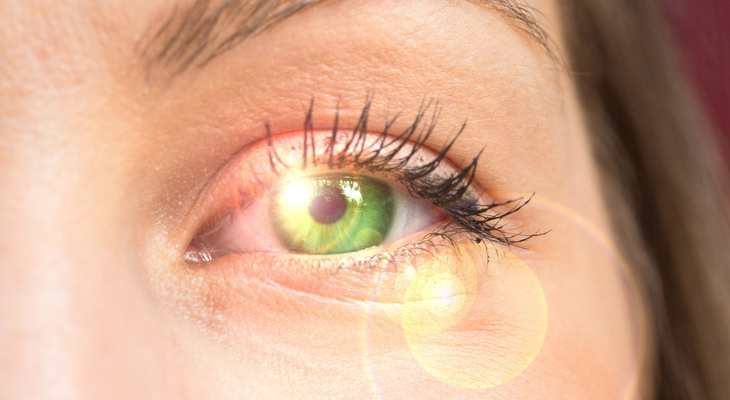
Symptoms of Retinal Vein Occlusion
Retinal vein occlusion (RVO), a condition caused by a blockage in a vein in your eye, could damage your vision unless prompt treatment is received. Understanding the signs and symptoms of this condition will help you spot signs of trouble and protect your eyesight.
What Is Retinal Vein Occlusion?
An RVO occurs when a vein in the retina becomes completely or partially blocked due to a blood clot. The retina, a light-sensing layer of tissue lining the back of the eye, sends light signals to the brain for processing. If there's a problem with the retina, the brain receives incomplete information and can't produce full, clear images.
Occlusions can affect the central main vein in the retina or one of the smaller veins that branch off from the central vein. Branch retinal vein occlusions often happen at the point where the retinal vein and artery come together, according to the American Society of Retinal Specialists.
Blocked veins prevent blood from draining from the retina naturally. As a result, fluid or blood may leak from the vein and build up in the macula, the area in the center of the retina. Called macular edema, this problem may make your central vision look blurry. At the same time, new, abnormal blood vessels may also form on your macula. Because these vessels aren't healthy, they may also leak blood and fluid and interfere with vision.
What Are the Symptoms and Causes of Retinal Vein Occlusion?
If you have an RVO, you may experience one or more of these symptoms:
- Blurred Vision
- Painless Loss of Vision (Vision loss can affect the entire eye or just one area)
- Lines, Dark Spots, or Floaters (Wisp-like strings that float in front of your eyes)
Usually, only one eye is affected, although both eyes can develop vision problems due to RVO in some cases.
You may be more likely to develop a blockage if you have atherosclerosis (hardening of the arteries) or high cholesterol. Fatty plaque builds up in the arteries due to high cholesterol. If a clump of plaque happens to break open, a blood clot could develop. People who have atherosclerosis are more likely to develop blood clots when blood vessels narrow and become less flexible. If a blood clot breaks free and travels to your eye, an occlusion could happen.
In addition to atherosclerosis and high cholesterol, these conditions may increase your RVO risk:
- High Blood Pressure
- Obesity or Being Overweight
- Diabetes
- A Blood Clotting Disorder
- Glaucoma
Glaucoma can increase your risk of an RVO and also be a complication of an occlusion. Glaucoma occurs when the pressure inside your eye is too high. The high pressure may damage the optic nerve, the connection between the brain and eye, causing permanent vision loss. Pressure inside your eye might increase if a vein becomes blocked due to RVO.
Treating and Preventing RVO
Ophthalmologists use anti-vascular endothelial growth factor (anti-VEGF) drugs to help clear your vision. The drugs are injected into your eye and work by stopping leaks, decreasing swelling, and preventing the formation of abnormal vessels in the macula. If anti-VEGF treatment doesn't help, you may need laser treatment to stop bleeding. The degree of improvement in your vision after treatment will depend on the severity of the condition.
Although treatment may help improve your vision, you'll need to make regular follow-up visits to your ophthalmologist. The Study of Comparative Treatment for Retinal Vein Occlusion 2 (SCORE 2) followed patients with RVO for five years after their diagnoses. According to researchers, most patients in the study still needed periodic treatment to keep macular edema under control for at least five years.
Regular visits to the ophthalmologist are important even if you haven't been diagnosed with RVO. If you have branch retinal vein occlusion, damage to your vision may affect your side vision and might not be noticeable. During eye exams, your eye doctor looks for subtle signs of RVO, glaucoma and other conditions that can harm your vision.
In addition to seeing the eye doctor regularly, other ways to protect your vision include:
- Keeping Chronic Conditions, Like High Blood, Diabetes and High Cholesterol, Under Control
- Improving Your Diet
- Losing Weight
- Exercising Often
Safeguard your vision with regular visits to the ophthalmologist. Give us a call to schedule your appointment.
Sources:
The Foundation: American Society of Retinal Specialists: Central Retinal Vein Occlusion
https://www.asrs.org/patients/retinal-diseases/22/central-retinal-vein-occlusion
The Foundation: American Society of Retinal Specialists: Branch Retinal Vein Occlusion
https://www.asrs.org/patients/retinal-diseases/24/branch-retinal-vein-occlusion
National Institutes of Health: Vision Improvement Is Long-Lasting with Treatment for Blinding Blood Vessel Condition, 4/21/2022
American Academy of Ophthalmology: What Is Branch Retinal Vein Occlusion (BRVO)?, 9/6/2022
https://www.aao.org/eye-health/diseases/what-is-branch-retinal-vein-occlusion
American Academy of Ophthalmology: What Is Central Retinal Vein Occlusion (CRVO)?, 10/13/2022
https://www.aao.org/eye-health/diseases/what-is-central-retinal-vein-occlusion
Medline Plus: Retinal Vein Occlusion, 2/17/2022
